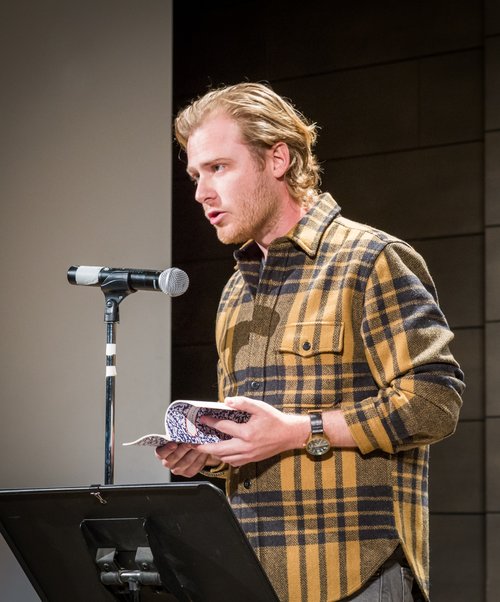
Two Allegheny Alumni Hold Prestigious Stegner Fellowships
Having one graduate serving as a Stegner Fellow at Stanford University is worth mentioning. But having two from Allegheny College holding those creative writing fellowships at the same time is cause for celebration.
Allegheny alumni Graham Barnhart ’07 and William Brewer ’11 both currently hold Stegner Fellowships, named for the late Wallace Stegner, founder of Stanford’s Creative Writing Program.
“Perhaps the most prestigious fellowship available to writers is the Stegner Fellowship at Stanford. These are very, very competitive, and the list of writers who have received them over the years reads like a who’s who of contemporary American literature,” says Christopher Bakken, Frederick F. Seeley Professor of English and English Department chair at Allegheny.
Brewer was awarded his fellowship in 2016 and is overlapping (the fellowships run for two years) with Barnhart, a 2017 recipient. “It’s simply astonishing that two Allegheny alums have won these and that they are there at the same moment,” says Bakken.
In awarding the fellowships, Stanford’s Creative Writing Program considers the quality of the candidate’s creative work, potential for growth and ability to contribute to and profit from the university’s writing workshops. Each year, five fellowships are awarded in fiction and five in poetry. The recipients receive modest living stipends, attend regular workshops and have access to the university’s resources.
Brewer visited his alma mater in October 2017 as part of the Single Voice Reading Series and was featured on a “PBS Newshour” segment that same month focusing on his book of poetry, I Know Your Kind (Milkweed Editions, 2017) about the opioid crisis gripping his native state of West Virginia.
As an undergraduate at Allegheny and later as a graduate student at Columbia University in New York City, Brewer said he “wanted to write about anything else” other than his home state. The opioid crisis, however, “was inescapable. Acquaintances were dying. My home was changing. It’s so bad now that the state has run out of money to help low-income families pay for funerals. I started to do some research — 780 million pills were consumed in 10 years in West Virginia. People who live there felt like they had no control over their lives, watching people they know become addicts.”
The book’s jacket describes Brewer’s poetry as “uncanny, heartbreaking, and often surreal. I Know Your Kind is an unforgettable elegy for the people and places that have been lost to opioids.”
Brewer’s previous chapbook, Oxyana, received a 2016 Poetry Society of America Chapbook Fellowship. Brewer’s work has appeared in Boston Review, The Iowa Review, Kenyon Review Online, Narrative, The Nation, A Public Space and other journals.
Brewer says he is currently working on another book of poetry and a novel. “If I’m not writing I get grumpy and sad,” he says. After finishing the fellowship, Brewer says he eventually would like to teach.
Barnhart, a native of Titusville, Pennsylvania, holds a Master of Fine Arts in poetry from The Ohio State University, and is a veteran of the U.S. Army. His work has received the 2016 Jeff Sharlett Memorial Award for Veterans and the 2015 Chad Walsh Poetry Prize, and his work has appeared in The Gettysburg Review, Gulf Coast, The Iowa Review, The Sewanee Review, Waxwing and Prelude, among other publications.
“I’m working on a collection of poems that draw from my military experiences. After graduating from Allegheny, I joined the Army and became a Special Forces medic,” says Barnhart. “I deployed to Iraq and Afghanistan then transferred to the Ohio National Guard in order to attend grad school at The Ohio State University. While there I deployed again to Afghanistan. I like to think of my poems as set in the context of war rather than simply being about war. I am interested in trying to reconcile what it means to be an artist and a soldier while trying to acknowledge and navigate the privilege that my position as a straight, white, American soldier affords me when it comes to writing about war.”
Barnhart said he, too, was deeply affected by the area in which he was born and raised. “Pittsburgh tends to get a mention here and there, but the whole region has been deeply influential to me, though not often explicitly in the work,” he says. “I think any kid from Titusville who happens to pass through the oil fields in Iraq would have to wonder at the strange trajectory that brought us from Colonel Edwin L. Drake (America’s first successful oil driller) to the present. I wouldn’t be writing any of these poems if I hadn’t been lucky enough to grow up and go to school where I did.”
Barnhart and Brewer meet regularly in the Stegner workshops at Stanford.
“Will’s great. I’ve been admiring his work for a long time,” says Barnhart. “I Know Your Kind is a beautiful book and difficult in the very best sense, so I was really excited to get to work with him. He just gave a Single Voice reading, and we were talking about what a landmark personal experience that is for any writer who studied at Allegheny. Along with the mentorship of professors like Dr. Bakken and Dr. (James) Bulman, the Single Voice series can be entirely blamed for my having ended up a poet, and I think Will feels the same way.”
Photos: Top Image–William Brewer; Inset — Graham Barnhart